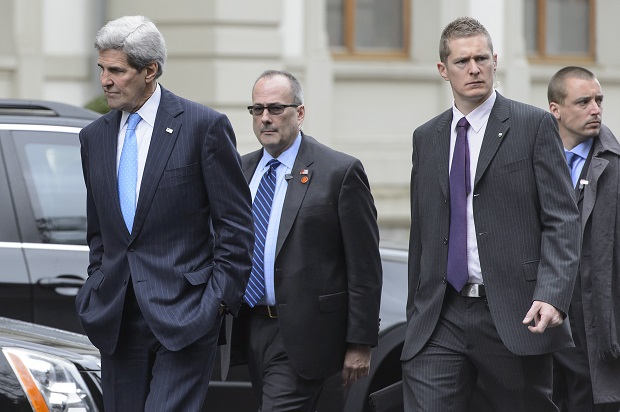
US Secretary of State John Kerry, left, takes a walk during a break of a new round of talks on the Iranian nuclear program in Lausanne, Switzerland, Sunday, March 29, 2015. AP
LAUSANNE, Switzerland — Iran is considering demands for further cuts to its uranium enrichment program but is pushing back on how long it must limit technology it could use to make atomic arms, Western officials involved in the nuclear talks said Sunday.
Iran’s potential movement on enrichment reflected the intense pressure to close a deal. But substantial differences between the sides may prove too difficult to bridge before Tuesday’s deadline for a preliminary agreement, which is meant to set the stage for a further round of negotiations toward a comprehensive deal in June.
The goal is a long-term curb on Iran’s nuclear activities. In return, Tehran would gain relief from the burden of global economic penalties.
Success possible
Foreign ministers and other representatives of Iran and the six powers in the talks have said there is a chance of succeeding by the deadline despite significant obstacles.
White House spokesman Josh Earnest said it was up to Iran to make that happen.
By accepting the restrictions, the Iranians would “live up to their rhetoric that they are not trying to acquire a nuclear weapon,” he said in Washington on ABC’s “This Week.”
From Israel, Prime Minister Benjamin Netanyahu renewed strong criticism of what he brands a bad deal. He is at the forefront of accusations that Iran helped the recent Shiite rebel advance in Yemen, and Netanyahu linked Iran’s alleged proxy grab for influence in the Middle East with what he sees as victory by Tehran at the negotiations in the Swiss city of Lausanne.
“The Iran-Lausanne-Yemen axis is very dangerous for humanity and must be stopped,” he said.
US Congress approval sought
U.S. Senate Majority Leader Mitch McConnell, heading a delegation of American senators visiting Israel, said the lawmakers supported legislation to require Congress to approve any agreement on Iran’s nuclear program, or to increase penalties against Iran if no deal is reached.
The officials in Lausanne said the sides were advancing on limits to aspects of Iran’s uranium enrichment program, which can be used to make the core of a nuclear warhead.
Over the past weeks, Iran has moved from demanding that it be allowed to keep nearly 10,000 centrifuges enriching uranium, to agreeing to 6,000.
The officials, who spoke on condition of anonymity because they were not authorized to publicly discuss the talks, said Tehran now may be ready to accept even fewer.
Iran backtracks on uranium shipments
Tehran is ready to ship to Russia all the enriched uranium it produces, the officials said, describing a change from previous demands that Iran be permitted to keep a small amount in stock.
One official cautioned that Iran previously had agreed to this, only to change its mind. Also, Iran’s official IRNA news agency on Sunday cited an unidentified Iranian negotiator as denying such an agreement had been reached.
Uranium enrichment has been the chief concern in over more than a decade of international attempts to cap Iran’s nuclear programs.
Tehran says it wants to enrich only for energy, science, industry and medicine. But many countries fear Iran could use the technology to make weapons-grade uranium.
Nuclear timeline
The United States and its allies want a deal that extends the time Iran would need to make a nuclear weapon from the present two months to three months to at least a year.
The officials said a main dispute involves the length of an agreement. Iran, they said, wants a total lifting of all caps on its activities after 10 years, while the U.S. and others at the talks — Russia, China, Britain, France and Germany — insist on progressive removal after a decade.
A senior U.S. official characterized the issue as lack of agreement on what happens in years 11 to 15. The official spoke on condition of anonymity in line with State Department rules on briefing about the closed-door talks.
Limits on Iran’s research and development of centrifuges also were unresolved, the Western officials said.
Faster uranium enrichment
Tehran has created a prototype centrifuge that it says enriches uranium 16 times faster than its present mainstay model. The U.S. and its partners want to constrain research that would increase greatly the speed of making enough weapons-grade uranium for a bomb, once limits on Iran’s programs are lifted.
One official said Russia opposed the U.S. position that any U.N. penalties lifted in the course of a deal should be reimposed quickly if Tehran reneged on any commitments.
Both Western officials Iran was resisting attempts to make inspections and other ways of verification as intrusive as possible.
Deadline approaches
There was tentative agreement on turning a nearly-finished reactor into a model that gives off less plutonium waste than originally envisaged. Plutonium, like enriched uranium, is a path to nuclear weapons.
Iran and the U.S. were discussing letting Iran run centrifuges at an underground bunker that has been used to enrich uranium. The machines would produce isotopes for peaceful applications, the officials said.
With the Tuesday deadline approaching and problems remaining, U.S. Secretary of State John Kerry canceled plans Sunday to return to the United States for an event honoring the late U.S. Sen. Edward Kennedy. French Foreign Minister Laurent Fabius and Frank-Walter Steinmeier, his German counterpart, scratched planned trips to Kazakhstan.
Kerry has been in discussions with Iranian Foreign Minister Mohammad Javad Zarif since Thursday.

